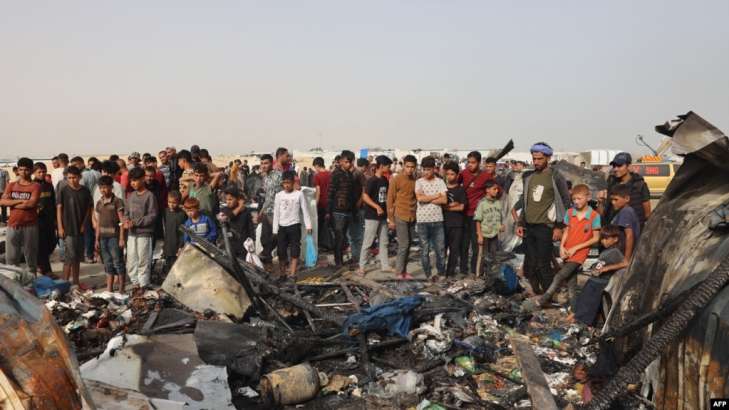
Photo: At the site of an Israeli strike on a camp for internally displaced persons in Rafah, Gaza Strip, 27.05. 2024/Eyada BABA/AFP
Initially, the Israeli military said it carried out a precise airstrike on the Hamas complex, but the fire killed civilians
On Monday, May 27, Israeli Prime Minister Benjamin Netanyahu admitted that a “tragic mistake” had been made. as a result of an Israeli strike on the city of Rafah in southern Gaza, where a tent camp housing refugees from the north of the strip caught fire and where, according to the local administration, “at least 45 people were killed.”
About the strike itself Russian service of the Voice of America spoke in detail earlier in her video report.
The UN Security Council convened an emergency meeting on Tuesday, May 28, reports AFP.
Meeting “behind closed doors” demanded Algeria, which is currently a non-permanent member of the Council.
Netanyahu did not specify the reason for the error. The Israeli military initially said it had carried out a precision airstrike against a Hamas compound, killing two senior militants. As details of the strike and fire became known, the military said it had opened an investigation into the deaths of civilians.
“Despite our best efforts not to harm innocent civilians, a tragic mistake occurred last night,” Netanyahu said in an address to the Israeli parliament on Monday, May 28. – We will investigate the incident and obtain a conclusion, because that is our policy..
Netanyahu said Israel must destroy the last Hamas battalions remaining in Rafah. On Sunday, May 26, a group of militants from this southern Gaza Strip city launched a rocket attack on the densely populated center of Israel, but the sound of a timely air raid resulted in no casualties.
The strike only added to growing international criticism of the Israel has clashed over the war with Hamas, with even its closest allies expressing outrage over the deaths of civilians.
The US National Security Council described the "devastating footage" strike on Rafah as “heartbreaking”. The council statement said the US was working with the Israeli military and others to assess what happened.
French President Emmanuel Macron was more blunt, saying in a post on Platform X that "these operations must stop.”
"There are no safe areas for civilians in Rafah. “I call for full respect for international law and an immediate ceasefire,” he wrote.
Qatar, a key mediator in efforts to secure a ceasefire and the release of hostages held by Hamas, said a strike on Rafah could “complicate” the war. negotiations that had already stalled over Hamas' demands for a lasting truce and the withdrawal of Israeli troops – conditions that Israeli leaders have publicly rejected.
Israel insists the country adheres to international law even as it faces scrutiny in the world's highest courts, one of which last week ordered a halt to the Rafah offensive.
Israel has denied the accusations genocide brought against him by South Africa in the International Court. Last week, a court ordered Israel to stop its offensive on Rafah. In addition, the International Criminal Court's chief prosecutor is seeking arrest warrants against Netanyahu and Israeli Defense Minister Yoav Galant, as well as three Hamas leaders, charging them all with war-related crimes.
Israel says it is doing everything possible to respect the laws of war and says it faces an enemy that accepts no obligations while infiltrating civilian areas in the Gaza Strip and refusing to unconditionally release Israeli hostages.
< br /> Israel has long maintained that it has an independent judiciary capable of investigating and prosecuting abuses in war.
Yet human rights groups insist that Israeli authorities routinely fail to fully investigate violence against Palestinians, and that even when soldiers are prosecuted, punishment is usually light.
The Israeli military's chief lawyer, Major General Yifat Tomer -Yerushalmi said that authorities were studying the strike on Rafah and that the military regretted the loss of civilian lives.
Speaking at a conference of Israeli lawyers, Tomer-Yerushalmi said Israel had opened 70 criminal cases relating to possible violations of international law, including the deaths of civilians, the conditions of detention of suspected militants and the deaths of some prisoners in Israeli custody. Cases of property crimes and looting in the sector are also being investigated.
On October 7, Hamas triggered a war with its attack on Israel, in which Palestinian militants killed about 1,200 people, mostly civilians, and took about 250 hostages. .
Since some of the hostages were released during a ceasefire last year,
Hamas militants continue to hold about 100 hostages and have not handed over the remains of about 30 more to Israeli authorities.
Israel's military operation in the strip has forced about 80% of Gaza's 2.3 million residents to flee their homes. The threat of famine remains, and UN officials say it has already begun in some parts of the sector.
According to the so-called "Ministry of Health of Gaza" (controlled by Hamas – ed.), which does not distinguish between fighters and non-combatants in its tallies, Sunday night's attack, which proved to be one of the deadliest of the war, helped raise the total number of Gaza Strip deaths in the current war to more than 36,000 people.
There are other cases that are subject to investigation.
So recently, the Egyptian military, without providing additional details, said that one of its soldiers was shot dead during a shootout in the Rafah area. Israel responded that it was in contact with Egyptian authorities, and both sides then said they had opened an investigation.
An initial investigation found that the soldier was responding to a firefight between Israeli forces and militants, Egyptian state television AL Qahera reported TV.
Egypt has warned that Israel's assault on the city of Rafah could jeopardize the two countries' decades-old peace treaty.
Prepared by: Sergei Daga

